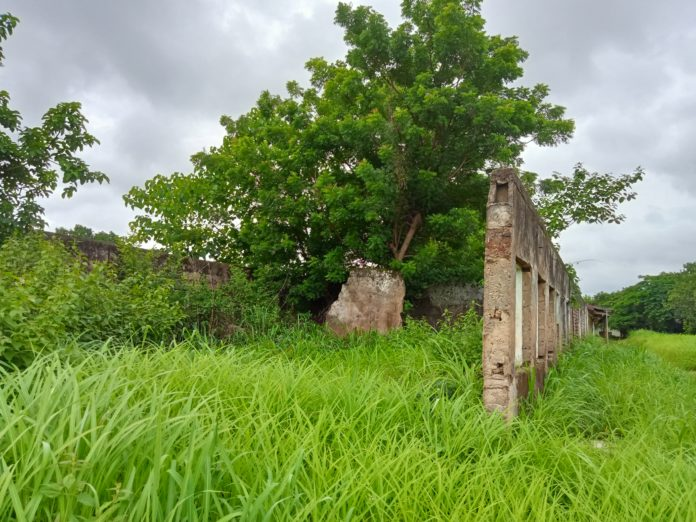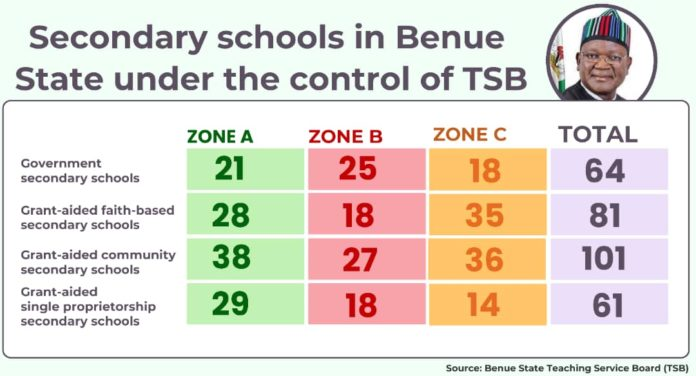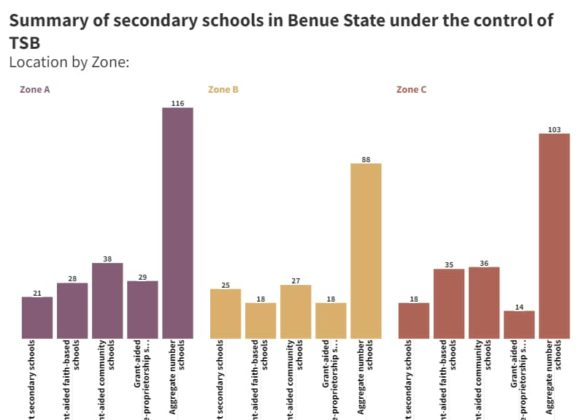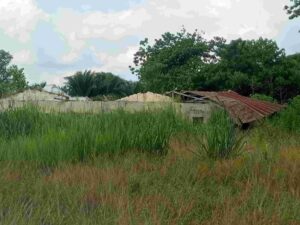By Iduh Onah, Amos Aar & Denen Achussah
Read Part 1 here, and Part 2 here.
Extortion of Schools by Education Officers
A vice said to have become a huge moral impediment in the administration of secondary schools in Benue State is the allegation of extortion of principals by officials of the Ministry of Education and TSB who routinely visit schools for inspection.
While the routine inspection is a standard practice put in place to regulate quality of teaching and keep the management of schools on their toes, the state’s education officers are said to have turned this duty into a money-making exercise.
Testimonies from multiple sources familiar with the practice indicate that authorities of all schools under the purview of TSB and the Ministry of Education have gotten used to greasing the palms of education inspectors with cash in lieu of transport, accommodation and feeding.

This practice, National Record gathered, has become institutionalised such that officials from the education ministry and TSB customarily request and receive this package during their routine visits. A number of principals disclosed that they are compelled to accede to the demand of the inspectors because the penalty for resistance is unfavourable report by the inspectors whose words are never questioned by the authorities at the ministry and TSB.
When asked in our interview if he was aware of the endemic nature of extortion of schools by officers who go round on inspection from TSB and Ministry of Education, the Executive Secretary of TSB, Dr Frank Kyungun, acknowledged the challenge of extortion prior to his appointment. He however contested that since he assumed office, he has sanitised TSB and therefore eliminated the vice.
Asked whether schools are responsible for financing education inspector’s trips; Kyungun said: “It is not the schools; that is why we collect quality assurance money. There is budget for quality assurance. It’s not only us that goes for monitoring, but even the Ministry [of Education] also goes, so I don’t know what happens in the ministry.

“But I tell you, when I came in, the system was highly polluted, the system was highly polluted by give-and-take, compromised even at the Board here. I have to transfer all those people out of this place. Even transfers and promotions were given based on give-and-take. That was how horrible it was here. But if they have been fair to me, ask them; the level of sanity that has been created here at the Board, the massive promotions that went on in the past two years, ask them, and nobody asked for one kobo here. I told them and I instructed that anybody that gives you promotion demanded anything, come and tell me. It is open! There is no teacher or principal that is barred; no, you can’t bar them out; it’s free; once you’re a teacher or staff.
“So, those ones, if we, the Board, are going for any activities that concerns monitoring, there is a budget, we give them money for transportation, feeding and accommodation. I told all of them [principals], don’t give any of them from the Board any money, all of them have been taken care of.”
Kyungun however blamed the principals who succumb to demands for gratification saying: “These teachers or these principals, they fetch us a lot of troubles in their records keeping. At the end, they seem to turn to see if they can bribe those people so that they can shield them. At times they will not tell you all those things. To cover up, they give them [inspectors] money not because they are insisting or they demanded; sometimes they give them money to cover up their dirty deals; that is the truth”
Kyungun gave an instance of malfeasance where two officers at the Board found culpable of accepting gratification were punitively transferred. “I told them that if anybody collects any money from any principal, they should tell me. You know these principals, when they ask them, they will start shivering, you know; they gave them money and they failed to tell me because they know very well that if they tell me, I will get them queried and they will go back to pounce on them.
“For here, the system has been so transparent in a way that if anybody collects money here, he goes. My own RC Salaries was involved in sharp practices and when I discovered, immediately I posted him to the classroom. I did the same thing to the man in charge of promotions. He was collecting money from people before he gave promotion; I transferred him to a community secondary school. So here at the Board is just a no-nonsense place, and is intolerant; we are intolerant of anything sharp practices and corruption, and that is what I introduced.”
Dearth of Teachers and PTA interventions
In all but just a few schools, especially those located in rural area, there is gross shortage of teachers. National Record gathered that the dearth of teachers is largely due to non-recruitment of fresh hands to replace those who retire, die or transfer their services to other sectors of the civil service. The last time teachers were recruited in the state, principals say, was in 2012.
To overcome the shortfall, principals evolved a standard strategy of hiring teachers and paying them using funds provided by the Parents Teachers Association (PTA) of their schools.
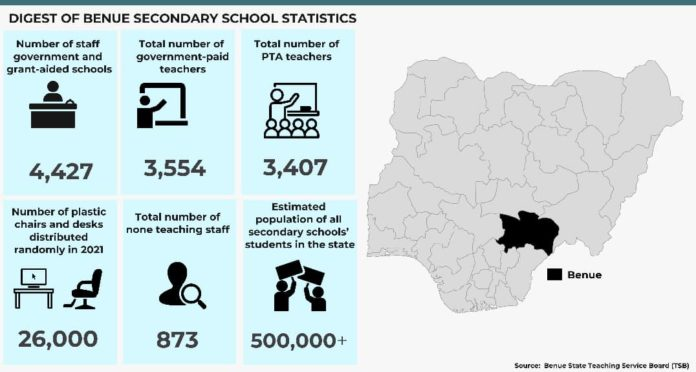
Dr Kyungun had in an interview with state-owned Radio Benue on May 18, 2022, revealed that the number of government-paid teachers and PTA teachers are neck on neck. According to him, whereas the total number government-paid teachers in the 307 government and grant-aided schools is 3,554, the total number of PTA teachers stands at 3,407.
Ironically, while the salaries of government-paid teachers are higher than that of PTA counterparts, the latter are paid promptly as against the former whose salary payment is never guaranteed as and when due. There is an outstanding salary arrears of five months hanging since 2017. April and May salaries were paid only in July while June, July and August are still being awaited as at press time.
Apart from their huge spending on teaching, the PTAs, along with old students’ associations of secondary schools, are also playing fundamental roles in the maintenance and construction of capital projects sustaining many schools. These two associations have become indispensable organs in the running of virtually every school, and without which all schools would have gone under.
National Record found in every school visited that the most viable facilities, with the exception of plastic chairs and desks recently supplied to select schools, were initiatives of either the PTA or old students or both.
A principal who said he had served in more than five different colleges in the last 15 years confided in National Record that any latest government infrastructure project in any school in Benue must be those executed prior to the current administration.
With the exception of GSS-Ulayi that has died, every school visited by this reporter, either or both associations had made, and continue to make, landmark investments in the areas of teaching and infrastructure.
Fruitless effort of Missions to reclaim their schools
The Catholic, Methodist and NKST Churches are arguably the custodians of formal education in Benue State and founders of solid and educationally sound schools that were among the best secondary schools in Nigeria.
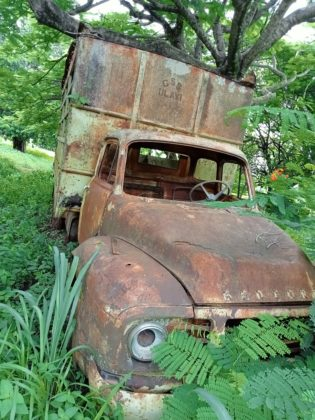
The heads of the education departments of these churches are on the same page in their views against the attitude of the Benue State Government towards education in general particularly the state’s current method of administration of secondary schools.
From the conversations with the heads of educational directorates of these churches, National Record, what came out clearly from them was a deep-rooted revulsion against the prevailing system where they felt that the only essential role of government in the current set up is the posting of teachers who, apart from being insufficient, are also practically poorly treated with their salaries not paid as and when due.

Against the backdrop of a host of challenges that increasingly suffocate schools, owners of mission schools had in the latter days of the Suswam leadership readily consented when the government muted the idea to return the mission schools to their owners.
Fr. Atama, in his narrative of the engagements with the Suswam government, said the white paper that was produced identified the core challenge being the lack of an education law in the state. “Part of what the white paper stated was that Benue State has no education law even up till today, even as we are talking. Without an education law, what guides the running of education in the state is the whims and caprices of whoever is in charge of the Ministry of Education become the law that operates! So we asked for a law.
“When Anambra State was going to handover schools [to proprietors], there was an education law to say, this is what we are using to operate now. Benue State has no education law to the best of my knowledge till this moment we’re sitting down here. The white paper said first of all, let there be a Benue education law so that when there is a handover, it is captured in the law so that nobody comes tomorrow to say that thing that was done was just a private arrangement or a play and so it doesn’t hold. No education law was done,” Fr. Atama said. Read his full interview here.
Speaking for the Catholic Diocese of Gboko in a telephone interview in June, Rev. Fr. Ignatius Him; who is the Education Secretary, said while the Gboko Diocese appreciates the harmonious relationship between the Church and the state, there are certain grey areas to be considered.
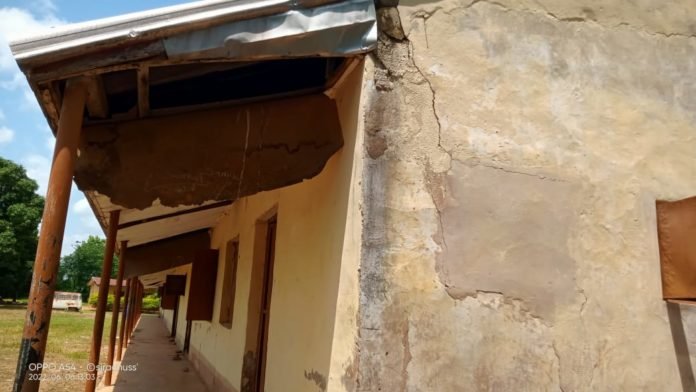
Fr. Him lamented the dearth of teachers which he said is at the heart of the grant-aid policy. He said apart from the very low number of teachers in grant-aided secondary schools, some of the teachers also have challenges of discipline, health and old age. “Even the grant-aid of teachers they talk about, if you go to our schools, you will see only two or three. Some of them are old, some are sick, and to some extent, we don’t even have control over them because when you tell them to do this, do that, they will refuse and they will tell you; ‘you can’t do me anything; you don’t pay me.’ So, that is it.”
Fr. Him also spoke on the handover of mission schools to their owners, PTA teachers, survival strategies of Catholic schools in Gboko Diocese, among other issues. Read his interview here.
Efforts to speak with the Education Secretary of the Otukpo Diocese of the Methodist Church of Nigeria, failed. However, a government-paid senior teaching staff at Jesus College, Otukpo, one of the oldest secondary schools in Benue State which is owned by the Methodist Church, while speaking under anonymity, told National Record that with the decay in all schools, the time is ripe for all stakeholders to come together to mount pressure on government to change its attitude in the administration of education.
“Are we going to continue to go like this? The education system in the whole country is nothing to write home; universities workers are on strike and what the political leadership are concerned about is election.

“Look at Jesus College today, look at the infrastructure. We inherited this school from European missionaries, many of them [missionaries] died and were buried here, their graves are here. It is sad that we Africans are always happy to inherit assets but we are incapable of managing them or even build new ones,” the official lamented.
He decried the way teachers are treated with levity, the unpaid salaries of teachers and how pay-days in secondary schools have become days of sadness in the lives of teachers. “Pay day is the saddest for us because before that day, we are usually indebted far above the wage you will collect. It is only God who knows how teachers are surviving in Benue State.”
According to the teacher, schools are now categorised by government into viable and non-viable schools based on the volume of revenue they generate and not on qualitative and quantitative measures. He said part of the blame for the decay of schools in the state goes to the state branch of ANCOPSS for its inability to be frank with Ministry of Education and TSB.
“Many principals have resolved not to attend ANCOPSS meetings because they don’t allow critical opinion to be aired. I can tell you that the problem of all the schools in Benue State are the same, if you have been to one you have been to all,” the official said.
In his interview with National Record, Mr John Patrick Abah, Benue State ANCOPSS President, said government secondary schools are in the condition they are because government failed to make any intervention.

“Government has not intervened in many of the secondary schools in Benue State apart from some few schools in the towns; like in Makurdi, Aliade and other towns. In most of the rural areas, government has not intervened, and because of the intervention of private schools, community schools and faith-based schools, parents withdraw their children from government schools to such schools and therefore it affects the infrastructural development at the schools. That’s the basic reason why government schools are like that,” Mr Abah said.
CSS Otukpa, an exception
Standing markedly apart from the prevalent and depressing sights of broken-down schools across Benue State, Community Secondary School (CSS), Otukpa, is a symbol and stimulating sliver of hope. That hope is crystallised in the bold inscription installed on a post a few meters into the premises – it reads: “OUR CHILDREN OUR FUTURE.”

Established in 1978 by indigenes of Otukpa Community in the then Okpokwu LGA, but now in Ogbadibo LGA, CSS-Otukpa’s success is, according to the principal of the school, Mr Peter John Agene, basically from the collective efforts of sons and daughters of Otukpa.
Apart from enrolling about the largest student population in Zone C with over 500 students, CSS-Otukpa also has arguably the healthiest facilities in the entire state. The stamp of quality is visible right from the school’s giant gate and perimeter fence to the classrooms fitted with comfortable modern furniture, sports facilities and solar-powered industrial borehole. Unlike many others, the school has two vehicles and the environment is generally clean and conducive for learning.
The Executive Secretary of TSB, Dr Francis Kyungun, acknowledged this when he said: “CSS Otukpa is a clean school; it is a very clean school; that is the best community secondary school in Benue State, I know it, I toured all the secondary schools in Benue State.”
The school’s ICT facility, a donation by Nigerian Communications Commission (NCC), is state-of-the-art. A staff of the school, who pleaded not to be named, told this reporter that the school is still work in progress. In addition to the ICT facility, the entire campus is fitted with solar powered street light donated by Chief Audu Ogbe, who is from Otukpa, the staff told National Record.

According to the staff who said he had been in the services of the school for a long time, the leap in the school’s development was accomplished during the ten-year tenure of the immediate past principal and state president of ANCOPSS, Mr John Patrick Abah, before his transfer to GSS-Okpoga where he currently serves. His development initiatives were said to have been consolidated by Mr Agene, the incumbent principal.
Through the collective efforts of the community, the management of the school was able to overcome the challenge of shortage of teachers by, through the school’s PTA, recruiting 18 teachers in addition to the 9 government-paid teachers, apart from the principal, two vice principals, and the dean.
Although Mr Agene declined to speak on details required by this reporter pertaining to government input in the development of the school and issues of deduction of levies by government, he however told National Record that the community ensured that CSS-Otukpa does not lack the essential facilities for enhanced learning, including the recruitment of all science teachers.
“We partnered with Otukpa sons and daughters for the development that is on ground. As a community school, the management of the school consults widely with Otukpa children outside the community; we call on them to help us to develop the school. Most of the things, the development you see are executed by Otukpa sons and daughters, both at home and abroad. Some of the projects, like our labs, they are donated by Otukpa sons and daughters in USA. Some of the buildings are built by some well-to-do Otukpa sons, like Danjuma Saleh, who is based in USA, although he said we should not mention his name as a benefactor of the school. He has done a lot; he has the mind to develop home,” Agene said.
On the school’s state-of-the-art ICT facility, the principal said: “Last year during the Covid-19 outbreak when everything was being done on the internet, we consulted Otukpa Forum, Abuja Branch, and they helped us to do that. There is a small unit at that building by your right as you enter the premises that Nigerian Communications Commission (NCC) started, that is our ICT unit. They are on it but we have been buying computers too and they have been fixed by Otukpa sons and daughters.”
A major project at hand, says the principal of CSS Otukpa, is the plan to commence boarding, possibly from 2022/23 academic session. According to the principal, the school’s board is discussing with prominent personalities from Otukpa on the possibility of starting the construction of two hostels, one for boys and another for girls. He said a properly run boarding school is viable in the area given the absence of a conventional secondary school with boarding facilities.
Looking ahead
With the decidedly dysfunctional primary and secondary education system in Benue State at the moment, with just a handful of decent schools, the entire structure of formal learning at all levels, demands an emergency if the broad political economy of the state is to be saved from a gradual descent into illiteracy-induced disorder which is perhaps already manifesting.
Concluded. View more graphic pictures of the decay here.
This investigation is supported by the MacArthur Foundation through the Wole Soyinka Centre for Investigative Journalism (WSCIJ).
Source: National Record

